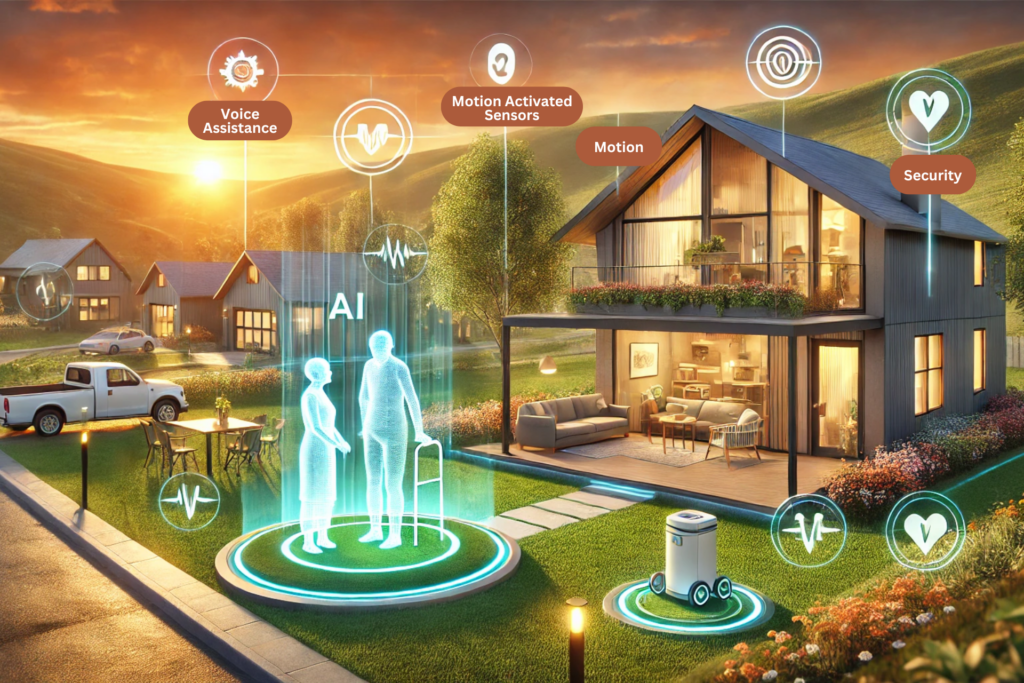Smart Technology for a Safer, More Independent Life

I remember sitting on my grandma’s porch, watching the sunset.
She always had a warm smile and a story to share, often telling tales from her childhood or giving advice she had repeated a hundred times before.
She used to tell the same stories over and over, but one day, she just… stopped remembering.
When she forgot my name, I knew something was wrong. Memory loss isn’t just about forgetting things—it’s about losing parts of yourself.
That’s why I wanted to learn how AI can help.
This eBook, AI and the Aging Brain: A New Frontier in Memory Care and Support, explains how artificial intelligence is making life easier for seniors and their families.
Let’s break it down in a way that’s easy to understand.
AI and Early Detection: Catching Memory Problems Sooner
Memory loss sneaks up on people. By the time it becomes obvious, a lot of damage has already happened.
That’s where AI comes in.
Imagine having a smart assistant that notices small changes in how someone talks, types, or remembers passwords.
AI tools can now pick up on early signs of memory loss before a doctor even notices.
Some AI apps, like CogniFit and Neurotrack, check speech patterns, eye movement, and daily habits to spot early signs of trouble.
These tools help doctors and families catch cognitive decline before it worsens. Your own built-in alert system that lets you or a doctor know when something isn’t right.
Smart Homes and Digital Helpers: Technology That Remembers for You
Imagine this: It’s 3 PM, and Alexa reminds Grandpa to take his medicine.
The lights adjust automatically to help him see better, and if he falls, an AI sensor calls for help.
No need for constant watching—technology is there to help.
For seniors with memory loss, remembering daily tasks and staying safe at home can be challenging.
Smart homes with AI are changing how seniors live by providing helpful reminders and safety features. They include:
- Voice assistants to remind them about appointments and medications
- Smart lights and thermostats that adjust automatically
- Motion sensors that alert caregivers if something seems wrong
- Emergency call systems that provide quick help
These aren’t just cool gadgets; they help seniors live safely and independently for longer.
AI in Healthcare: Better, Faster, Smarter
Doctors and hospitals are also using AI to improve healthcare.
AI can go through years of medical history in seconds, spotting patterns that would take doctors months to figure out.
That means faster diagnoses, personalized treatment, and even wearable health devices that track heart rate, oxygen levels, and sleep.
For seniors, this means:
- Fewer unnecessary trips to the doctor
- Faster diagnosis of dementia and Alzheimer’s
- AI chatbots that answer health questions 24/7
- Remote health monitoring so doctors can step in before an emergency
AI in Caregiving: Making Life Easier for Families
Ask any caregiver, and they’ll say taking care of a loved one is both rewarding and exhausting. In fact, studies show that over 60% of family caregivers experience high levels of stress, and many struggle with burnout. The emotional and physical toll can be overwhelming, which is why AI is stepping in to help. AI is stepping in to help.
AI can:
- Keep track of schedules and medications
- Monitor health in real-time
- Offer robotic companions to reduce loneliness
- Predict health problems before they get serious
This doesn’t mean AI replaces human caregivers. Instead, it helps them focus on what matters most—spending quality time with their loved ones.
The Big Questions: Is AI a Good Thing for Senior Care?
AI is helpful, but it raises some important questions:
- Privacy – Who gets access to all this personal data?
- Fairness – Will AI-powered care be affordable for everyone?
- Human Connection – Can technology ever replace real human companionship?
The key is balance. AI should help people, not take over.
It’s just a tool—one that should work alongside family members and caregivers, not replace them.
What’s Next for AI in Senior Care?
We’re only getting started with AI, but it’s important to recognize its limits.
AI can’t replace human care and emotional connection, and there are still concerns about privacy, cost, and accessibility.
However, with responsible development, AI has the potential to make a big difference in senior care. In the future, we may see:
- AI-powered robots that help with walking and daily tasks
- Smart systems that warn doctors about health problems before they happen
- Even smarter AI assistants that adjust as a person’s needs change
There’s still work to do to make AI fair, safe, and easy to use, but one thing is certain—AI is changing senior care in a big way.
Final Thoughts: How AI Can Make Life Better
If my grandma had AI-powered memory aids, would it have helped? Maybe.
What I do know is that we now have technology that can truly make life easier for seniors and their families.
The key is using it wisely.
So, if you’re taking care of a loved one—or thinking about your own future—it’s time to consider AI.
It’s not about replacing human connection; it’s about making life smoother and safer. And that’s something worth getting excited about.
Take Control of Your Health with AI!
Ready to make your health monitoring easier and more effective?
My book, AI and the Aging Brain: A New Frontier in Memory Care and Support, will guide you step-by-step. It shows how AI-powered tools can help you stay healthy, independent, and worry-free.
💡 Regular Price: $9.95
💰 With Discount Code: Only $3.95!
👉 Grab Your Copy Now – Use code brain at checkout to unlock your special price!
Don’t wait—start using AI to stay healthier and live more confidently today!

Leave a Reply
You must be logged in to post a comment.